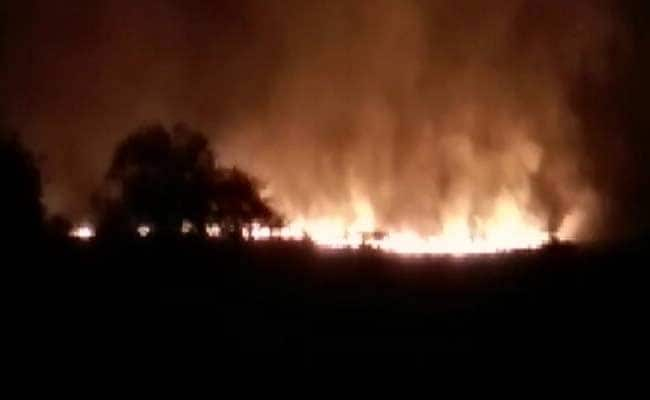The fire at Pulgaon ammunition depot had erupted on Tuesday and raged for hours, killing 19 people.
New Delhi:
The anti-tank mines that exploded at the Pulgaon Central Ammunition Depot killing 19 people earlier this week, were defective and leaking and despite repeated reminders no action was taken, top government sources have told NDTV.
An inquiry is on into the fire had erupted on Tuesday and raged for hours, killing firefighters, soldiers and two officers. It was understood that it had started after a leakage from explosives and survivors had said it could have been triggered by heat.
Today, sources told NDTV that a chunk of the 80,000 anti-tank mines, supplied to the Army in 2009-2010 by the Chanda Ordnance Factory in Maharashtra, were defective. "Just after delivery, it was found that the fibre casing of the mines had cracked, spilling the explosives," a top official told NDTV.
The army had flagged issue, highlighting the hazards.
In 2009, explosive experts were rushed from the ordnance factory. "The OFB promised to repair the casings, but it did not happen. And it couldn't come up with a better solution," the official said.

From 2009 to 2016 the defective mines were kept at Pulgaon Ammunition Depot. Sources said the Army wrote at least 20 letters, underlining the dangers. The army was "promised repairs and a solution, but nothing came about," the official said.
"TNT when kept in a casing is very stable, but when explosives exude or leak out, and is subject to extreme heat, it could change they become very unstable," Lieutenant General Pradeep Bhalla, former chief of the Ordnance Corps told NDTV. "Add to it that temperatures in Pulgaon often touch 49 degrees Celsius," the General said.
The Army cannot destroy any defective explosives till it is cleared by the government. And in this case, despite repeated reminders, a decision to destroy the defective mines wasn't taken "because it would mean writing-off crores of rupees," a senior officer told NDTV.
An inquiry is on into the fire had erupted on Tuesday and raged for hours, killing firefighters, soldiers and two officers. It was understood that it had started after a leakage from explosives and survivors had said it could have been triggered by heat.
Today, sources told NDTV that a chunk of the 80,000 anti-tank mines, supplied to the Army in 2009-2010 by the Chanda Ordnance Factory in Maharashtra, were defective. "Just after delivery, it was found that the fibre casing of the mines had cracked, spilling the explosives," a top official told NDTV.
The army had flagged issue, highlighting the hazards.
In 2009, explosive experts were rushed from the ordnance factory. "The OFB promised to repair the casings, but it did not happen. And it couldn't come up with a better solution," the official said.

From 2009 to 2016 the defective mines were kept at Pulgaon Ammunition Depot. Sources said the Army wrote at least 20 letters, underlining the dangers. The army was "promised repairs and a solution, but nothing came about," the official said.
"TNT when kept in a casing is very stable, but when explosives exude or leak out, and is subject to extreme heat, it could change they become very unstable," Lieutenant General Pradeep Bhalla, former chief of the Ordnance Corps told NDTV. "Add to it that temperatures in Pulgaon often touch 49 degrees Celsius," the General said.
The Army cannot destroy any defective explosives till it is cleared by the government. And in this case, despite repeated reminders, a decision to destroy the defective mines wasn't taken "because it would mean writing-off crores of rupees," a senior officer told NDTV.
Track Latest News Live on NDTV.com and get news updates from India and around the world

